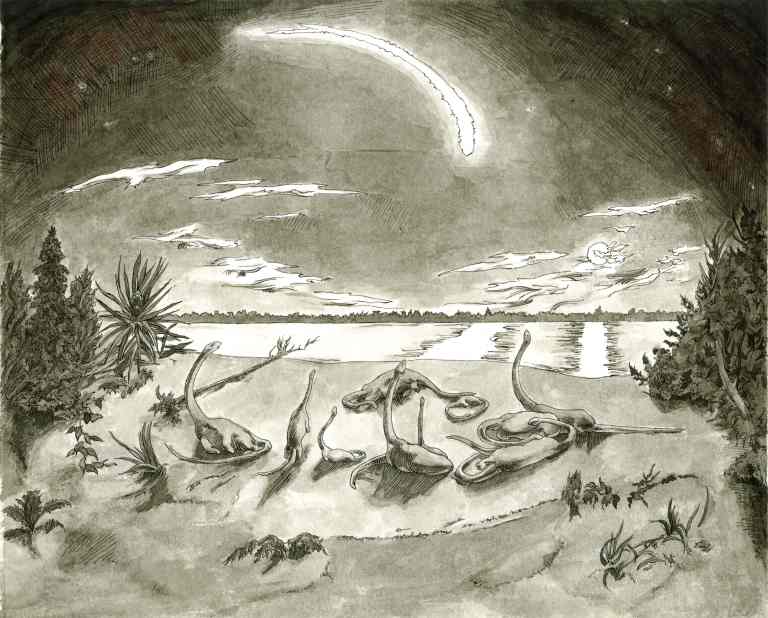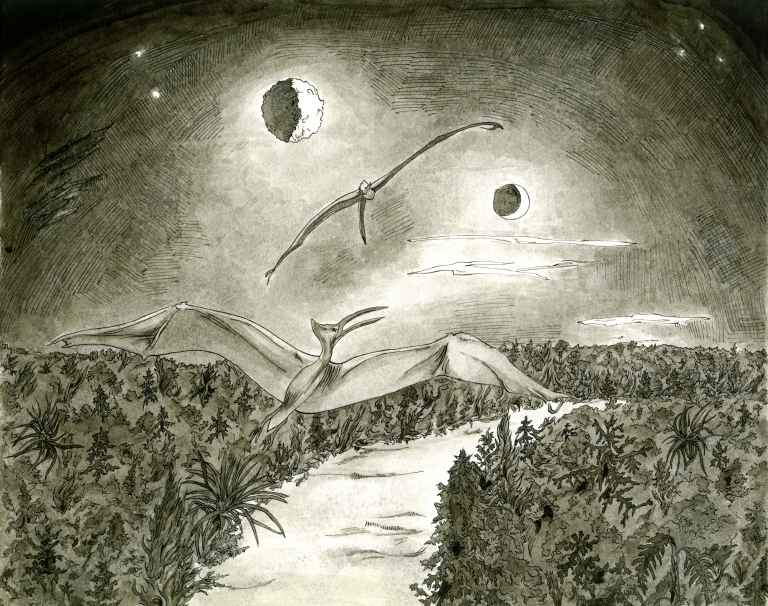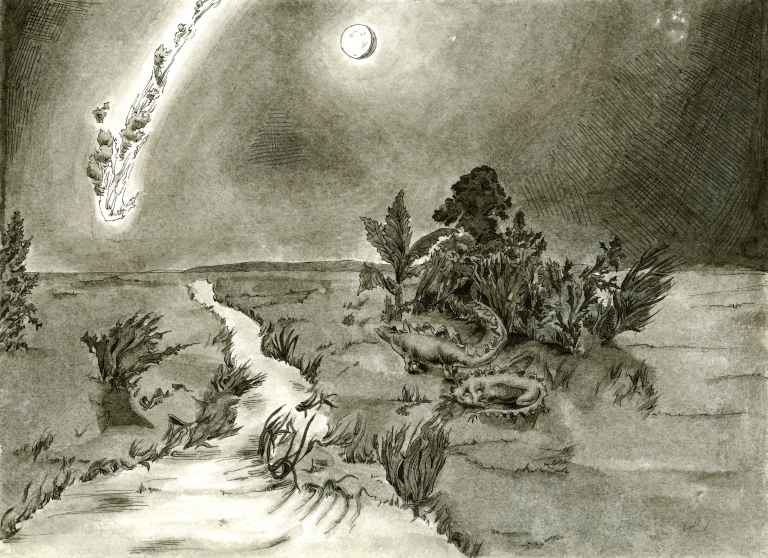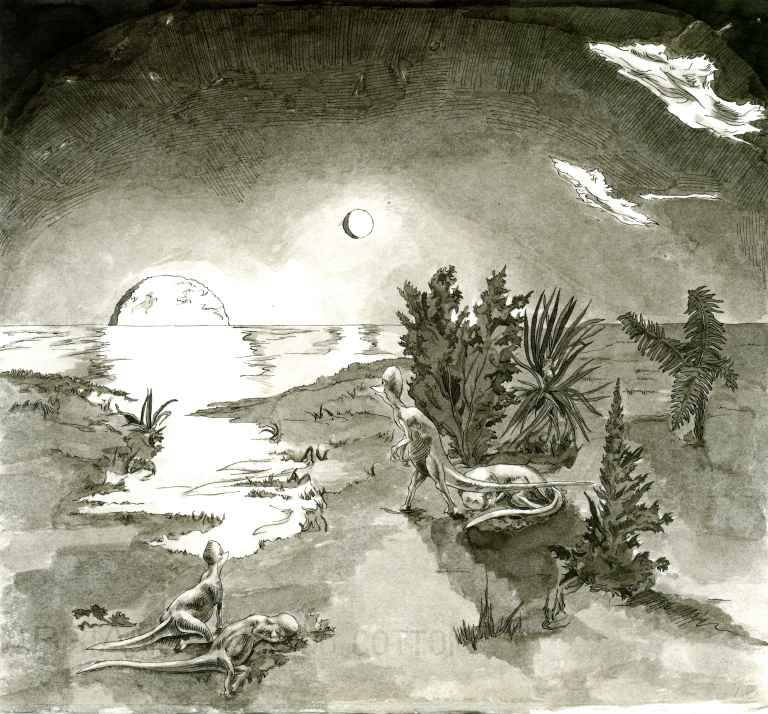 |
Evening and MorningIt is sometimes asserted that a 'day' in scripture is always 24 hours. Is that so? |
 |
|
Deuteronomy 11:21 speaks of the "days of heaven:" "And you shall write them on the doorposts of your house and on your gates, that your days and the days of your children may be multiplied in the land of which the Lord swore to your fathers to give them, like the days of the heavens above the earth." (Deuteronomy 11:20-21); ("days of heaven" KJV) . What are the "days of heaven"? If all days are twenty-four hours long, what benefit could there be in this blessing? Why not say 'days of Podunk,' or 'days of Akron,' they'd be just as good? The institution of the sabbath is modelled after God's activity, and rest, in creation. But scripture is so far from demanding that the six, or seventh, day be twenty-four hour periods, that it happily counts sabbaths of years, and weeks of years: "And you shall count seven sabbaths of years for yourself, seven times seven years; and the time of the seven sabbaths of years shall be to you forty-nine years. Then you shall cause the trumpet of the Jubilee to sound on the tenth day of the seventh month; on the Day of Atonement you shall make the trumpet to sound throughout all your land." (Leviticus 25:8-9). Using the sabbath to prove twenty-four hour days leaves the Sabbatical year and the Jubilee stranded above the water-line. Realizing God's immensity and transcendence, it seems dubious that He sets His alarm clock like a farmer so He does not forget to do His chores. Why would He be bound by our time scale? Rather, He has ordained our little days to mimic His activity in creation. |
 |
Changing TimesGod not only wrote the Bible, but created the astronomy that defines the Bible's 'day.' Had God intended the day to be a constant interval, He could have so constrained the laws of nature. But the observational day is not a constant interval; it changes throughout the year, and down through the ages of time: "The basis of astronomical time systems is the Greenwich mean solar time, denoted by UT (Universal Time), sometimes also by GMT. The universal time obtained directly from observations is called UT0. If we correct this for changes of the meridian due to motions of the Earth's rotation axis (precession, nutation, motion of the pole), we get UT1. Even this is not accurate enough for modern time measurements. UT1 suffers from tiny irregularities caused by variations in the Earth's rotation rate. These variations have at least two periods, one year and half a year. Removing these effects we get UT2, which has relative errors of the order 10-7. Even UT2 is not exact because of long-term changes in the Earth's rotation, such as slowing down due to tidal friction...The Earth's rotation rate has been slowing down so that since 1972, a leap second has been added nearly every year." (Fundamental Astronomy, H. Karttunen, P. Kroger et al, p. 39). A second per year is a minute every sixty years, an hour in 3,600 years. No one has ever 'corrected' the computation of the sabbath for this phenomenon, because it's not the clock but darkness that starts the sabbath. The day that God created is not a fixed interval, but the continuing oscillation of dark and light. |
|
The same God who inspired the Bible also wrote the book of nature: ". . .for the book of nature, which we have to read, is written by the finger of God." (Michael Faraday, Experimental Researches in Chemistry and Physics, p. 471). He made and ordered all things created, He gave law and meaning to creation, the natural realm is His handiwork. "No sound minded man disputes any scientific fact. Religious men believe with Agassiz that facts are sacred. They are revelations from God." (Charles Hodge, What is Darwinism?, p. 78). Nature and revelation are two works by the same author, a two-volume set:
"Besides, there is this important fact that must not be forgotten, the God who is the Author of revelation, is also the Author of creation, and providence, and history, and everything else from which you ought to draw your illustrations. When you use natural history to illustrate the Scriptures, you are only explaining one of God’s books by another volume that He has written."
(Spurgeon, Charles H. (2010-05-18). Lectures to My Students (p. 406). Zondervan. Kindle Edition.)
Some readers claim nature is artificially 'distressed,' that God is like an unscrupulous antiques dealer who makes something look old when it is not. But according to the word, God "cannot lie."
"I love to think of nature as an unlimited broadcasting system, through which God speaks to us every hour, if we will only tune in."
(George Washington Carver, Quotations on About.com)
We should read Genesis with the Bible in one hand and the book of nature in the other. At long last for our generation the second book is opening itself to clear the obscurities in the first; it is God's own commentary on Genesis. If, as some claim, God has testified dishonestly in the one, how can we trust His testimony in the other? Bible-believers who would see the evident blasphemy in the premise, 'You can't trust what God says in the Bible to be true, perhaps He is testing us,' nevertheless talk as if nature, His other masterwork, were an atheist fabrication. God made it; it is not falsified!
The two books not only do not conflict, but harmonize wonderfully. How long before the worldly thought of the 'Big Bang' did God's people know it all started with "Let there be light"!
 |
Fourth Day
God created the sun on the fourth day of creation. The Bible does not say the sun, the "greater light," was created previously but only appeared on that day, but that God "made" them on that day. Twenty-four hours is the period of the earth's rotation, turning toward and away from the sun's light. Before that luminary was lit, how could a 'day' have had reference to the sun's daily rising and setting? 'Darkness' and 'light,' prior to the fourth day, cannot have had any reference to the sun's daily routine and thus there is no reason to suppose this divinely ordained tag team counted out twenty-four hours. |
|
Strictly speaking, there is no such thing as chance; there is no falling sparrow outside God's domain. The hallmark of God's creation is the superabundance of order there is in the world. Those who look for order, find it. But those who look for order amongst living things, searching out a 'periodic table' of the animals, are laughed at by those intent on assigning causality to what is not.
Some in the modern world have revived the old Epicurean paradigm of a world brought about by chance and selection. This is not a testable scientific hypothesis, but a global explanation of everything, which some find satisfying. Chance cannot be a cause, because it is not anything. There must be an equal degree of reality in the cause as in the effect; an unreal cause cannot bring about a real result. Explaining everything by resorting to nothing is unsound.
 |
Say What?These pictures show the cataclysmic event which brought the evening or night-fall of the sixth day, the onset of the 'nuclear winter' which closed the epoch of the birds a.k.a. dinosaurs. Prior to Darwin, people traced mass extinctions to cataclysms. Then Darwin explained there were no cataclysms, it all happened 'gradually.' People have quietly dropped that and gone back to cataclysms. A comet has ever been a portent of doom, and so it was for the dinosaurs. It's a long-standing idea that change happens gradually: "One tenet of geology, first articulated in the nineteenth century and followed assiduously ever since, is that 'the present is the key to the past.' This is what's known as 'uniformitarianism.' It's the idea that we can understand earth history by appealling to geological processes that we see in operation on the planet's surface today. . .'Uniformitarianism is completely wrong,' said Peter Ward. 'It's totally wrong. It misleads us. You can't use the present as the key to the past because there were times in the past that were so radically different we can't even conceptualize them.'" (The Ends of the World, Peter Brannen, pp. 122-135). But even wordly people no longer believe in uniformitarianism. Incidentally, it doesn't seem like it works on Mars any better than it does on Earth: "Yet the Red Planet underwent the climatic equivalent of a sudden death." (The Search for Life on Mars, Elizabeth Howell. p. 76). It is sometimes suggested by young-earth creationists that animals cannot have died before Adam's fall, that they must have been created immortal, as was man, for whom death is indeed a self-inflicted wound. But scripture throughout chides man for dying like the beasts: "Nevertheless man, though in honor, does not remain; he is like the beasts that perish." (Psalm 49:12). If man brought death to the blameless beasts, why is death pre-eminently their characteristic, rather than man's? |